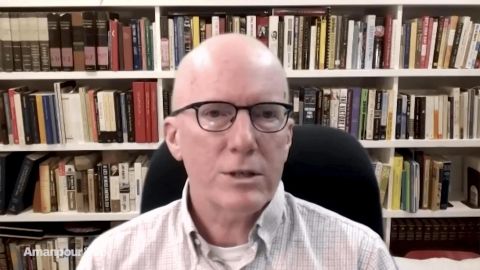Read Transcript EXPAND
NORM ORNSTEIN, POLITICAL SCIENTIST: My son, Matthew, who was a brilliant young man, a national champion high school debater, went to Princeton, was out in Hollywood and doing well. And at 24 had a psychotic break, believed that God had come for him, had taken his soul but not his body, and he was on a struggle to get back his soul. He had no insight into his illness and went through 10 months of hell, as we did in his family, because the system is broken and there was nothing that we could do. He was over 18. We couldn’t order treatment or get — often information about where he was or what he was doing. And he died at age 34, on January 3, 2015 accidentally, carbon monoxide poisoning in a motel room, and we decided that rather than curl up into balls as we were inclined to do, we wanted to do something to help other families from going through what we went through and help other people from going through what Matthew went through. And as we went on our journey to do something along these lines, we encountered Judge Leifman. My wife and I — Judith Harris and I went down to Miami, immersed ourselves in the program, we’re blown away by the fact that you could save lives and save money, and decided that if we could do a documentary on this, personalizing it, and showing through the power of film, we could then take it around the country and maybe to other places and use it as a catalyst to spread best practices.
AMANPOUR: Well, clearly, you know, you probably hadn’t realized, but these best practices is coming at the most incredible time. Because everybody is trying to figure out how to implement best practices in other parts of, you know, the system in the United States, including police reform, et cetera. So, I just want to ask you, Judge Leifman, to put it in some sort of numerical context how bad this situation is. I’ve read a couple statistics that every year more than 1.7 million people with serious mental illnesses are arrested. And you said, when I became a judge, I had no idea I was becoming a gatekeeper to the largest psychiatric facility in the State of Florida, the Miami-Dade County Jail.
STEVE LEIFMAN, ASSOCIATE ADMINISTRATIVE JUDGE, ELEVENTH JUDICIAL CIRCUIT COURT OF FLORIDA: So, we have about five times more people in our jail with serious mental illnesses just in Miami-Dade County than at any state psychiatric hospital in Florida. And it’s not that they just get arrested more, they stay four to eight times longer than someone else for the exact same charge because the courts don’t know what to do with them.
About This Episode EXPAND
Steve Leifman and Norm Ornstein discuss mental illness and the prison industrial complex. Director Amma Asante discusses Hulu’s new mini series “Mrs. America.” Charles Stewart, director of MIT’s Election Data and Science Lab, discusses voting by mail and why election officials need to prepare now for November.
LEARN MORE


